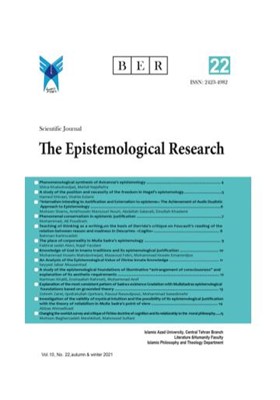Phenomenal conservatism in epistemic justification
Subject Areas : Epistemological researches
1 - دانش آموخته دکتری فلسفه دانشگاه تهران
Keywords: Epistemic Justification, phenomenal conservatism, seeming, Huemer,
Abstract :
One of the most important views of epistemic justification in contemporary epistemology is phenomenal conservatism. According to this view on justification, if it seems to one as if a proposition is true, one is prima facie justified in believing in it; Therefore, according to those who believe in this view of justification, if it seems true to me that I got the Covid-19 vaccine today, I have justified to believe in the proposition that “I got the Covid-19 vaccine today.” Believers in view of phenomenal conservatism claim that this view is a complete theory of epistemic justification and also provides correct intuitive results in different types of beliefs. In this article, we will explain, interpret and evaluate this view in epistemic justification. We will first articulate and evaluate different perspectives about the nature of “seeming”, and then present an account of phenomenal conservatism. While interpreting and evaluating problems of this view, we come to the conclusion that this view is neither a necessary nor a sufficient condition for justification; Hence, we can argue that this view cannot be considered as an acceptable view for the epistemic justification of one’s beliefs.
Conee, Earl. (2013). “Seeming evidence”. in Chris Tucker (ed.). Seemings and justification: New essays on dogmatism and phenomenal conservatism. (52–68). New York: Oxford University Press.
Conee, Earl and Feldman, Richard. (2008). “Internalism Defended”. in Ernest Sosa et al. (eds). Epistemology: An Anthology. (407- 421). Oxford: Blackwell Publishing.
Hasan, Ali. (2013). “Phenomenal Conservatism, Classical Foundationalism, and Internalist Justification”. Philosophical Studies. 162: 119-141.
Huemer, Michael. (2007). “Compassionate Phenomenal Conservatism”. Philosophy and Phenomenological Research. 74: 30-55.
———. (2006). “Phenomenal conservatism and the internalist intuition”. American Philosophical Quarterly. 43: 147-158.
———. (2013). “Phenomenal conservatism uber alles”. in Chris Tucker (ed.). Seemings and justification: New essays on dogmatism and phenomenal conservatism. (328–350). New York: Oxford University Press.
———. (2001). Skepticism and the veil of perception. Lanham, MD: Rowman & Littlefiled.
Lycan , William G. (1988). Judgement and Justification. Cambridge: Cambridge University Press.
Markie, Peter J. (2005). “The Mystery of Perceptual Justification”. Philosophical Studies. 126: 347–373.
———. (2013). “Rational Intuition and Understanding”. Philosophical Studies. 163: 271–290.
McCain, Kevin. (2017). “An Isolation Objection to Phenomenal Conservatism”. Erkenntnis. 82: 1381-1390.
———. (2014). Evidentialism and Epistemic Justification. New York: Routledge.
———. (2018). “Explanationist aid for phenomenal conservatism”. Synthese. 195: 3035-3050.
Rogers, Jason and Matheson, Jonathan. (2011). “Bergmann’s Dilemma: Exit Strategies for Internalists”. Philosophical Studies. 152: 55–80.
Sosa, Ernest. (1998). “Minimal Intuition”. in Michael DePaul and William Ramsey (eds). Rethinking Intuition. (257–270). Lanham, MD: Rowman & Littlefield.
Sosa, Ernest et al. (2008). “Introduction”. in Ernest Sosa et al. (eds). Epistemology: An Anthology. (305- 309). Oxford: Blackwell Publishing.
Swinburne, Richard. (2001). Epistemic Justification. Oxford: Oxford University Press.
Tollhurst, William. (1998). “Seemings”. American Philosophical Quarterly. 35: pp. 293-302.
Tooley, Michael. (2013). “Michael Huemer and the principle of phenomenal conservatism”. in Chris Tucker (ed.). Seemings and justification: New essays on dogmatism and phenomenal conservatism. (306–327). New York: Oxford University Press.
Tucker, Chris. (2013). “Seemings and justification: An introduction”. in Chris Tucker (ed.). Seemings and justification: New essays on dogmatism and phenomenal conservatism. (1–29). New York: Oxford University Press.
———. (2010). “Why open-minded people should endorse dogmatism”. Philosophical Perspectives. 24: 529-545.
Williams, Bernard. (1973). “Deciding to Believe”. in Bernard Williams. Problems of the Self. (136–151). New York: Cambridge University Press.
_||_

